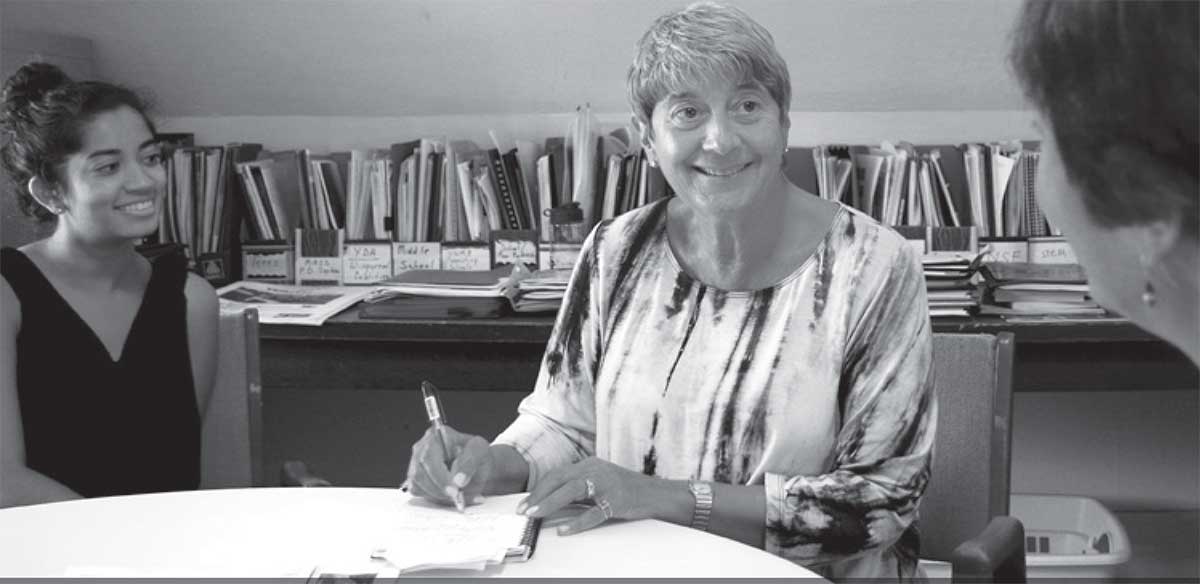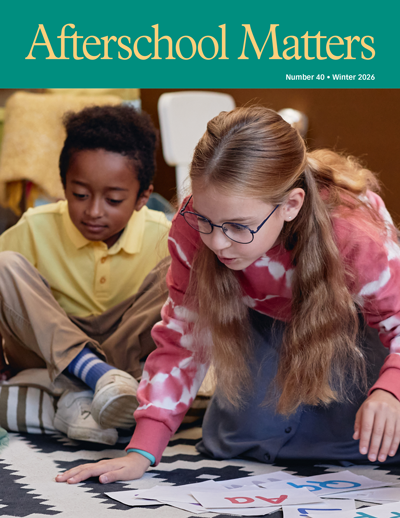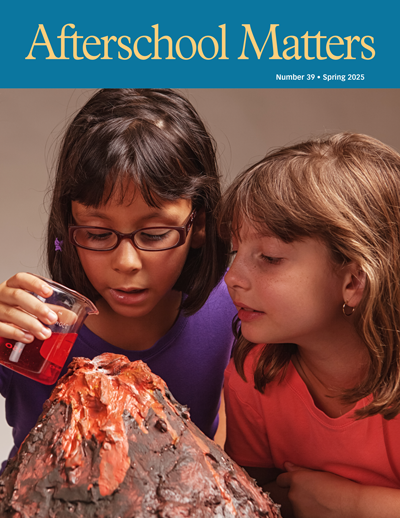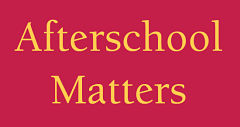System Building, Relationships, and Quality Interview with NIOST’s Ellen Gannett
By Georgia Hall
 Over the last nine months, Ellen Gannett, former director of the National Institute on Out-of-School Time, has transitioned to a new part-time role as NIOST’s senior strategist. Georgia Hall, the new director and managing editor of Afterschool Matters, asked Ellen to share her perspectives on the field and on a lifetime dedicated to raising the quality of youth experience during the out-of-school time hours.
Over the last nine months, Ellen Gannett, former director of the National Institute on Out-of-School Time, has transitioned to a new part-time role as NIOST’s senior strategist. Georgia Hall, the new director and managing editor of Afterschool Matters, asked Ellen to share her perspectives on the field and on a lifetime dedicated to raising the quality of youth experience during the out-of-school time hours.
Georgia Hall: This has been a significant transition in your career. Tell us about your work over the years in this field. How did you arrive to it, and what has it been like for you?
Ellen Gannett: Many people call me a “lifer” in the field of afterschool. I came to NIOST in 1981, but even before that, I was a practitioner for seven or eight years, running an afterschool program in the suburbs of Boston. So afterschool has been pretty much the only thing I’ve done in my professional life. When I think about my career here at NIOST—it’s been so many years and so many roles, with many different projects and interests, that it’s hard to summarize except to say that it’s been a fabulous career.
I’m close to being fully retired, but I couldn’t imagine just saying goodbye to this work. So the opportunity to be semi-retired was appealing. Moving from being the director of NIOST to a streamlined parttime position as senior strategist allows me to be more selective. I can pick and choose areas where I can make a difference—things I have tried to accomplish for a long time where work still remains to be done.
Georgia: What areas of your work at NIOST have meant the most to you?
Ellen: So many! To take one: The MOST initiative was a groundbreaking experience. It was one of the first system-building efforts in out-of-school time. We were ahead of our time, before the field and the nation were ready to embrace it fully. Still, I’m proud of the work we did because it set the stage for what became, years later, a major effort on system building at the city level. That was satisfying because we got to share lessons learned with nine cities across the country.
Georgia: You’ve also done significant work in professional development.
Ellen: Yes, anything to do with professional development has been my first love. Working to set up national credentials for afterschool providers, professionalizing their work, creating a sustainable system for educating providers at the college level—I feel I’ve dabbled in many experiments, none of which have caught on to the point where you could say, “Now we’ve got a system for professional development for afterschool providers.” But it’s been really satisfying work, and I continue to be really interested in it. Connecting the dots is so important—connecting the work so child care, education, and youth development come together as a single field rather than disparate parts.
Georgia: Is there one thing you’re particularly proud of?
Ellen: I take great pride in all of the things we do here at NIOST—not just what I do, but everyone. That we were the first to develop national standards for quality. That we put together a set of core competencies for afterschool providers. We’ve given a lot of standards to the field—like the ones we created with the HOST Coalition on healthy eating and physical activity in out-of-school time. I’ve had the privilege of working with hundreds, if not thousands, of people across the country to help them start programs or get their programs to be as wonderful as they could possibly be. That’s been very gratifying. I love going back to those communities, when I can, to see the results of that work.
Georgia: What do you think are the greatest challenges facing the out-of-school time field in the next four or five years?
Ellen: How much time do we have? [Laughs] First, sustainable funding. We’re always fighting the fight for the next round of funding for this work. Our sense that we don’t know what’s coming next makes it hard to plan—and the result is uneven quality.
Couple that with turnover. We’re not paying our staffs well enough that people can think of it as anything but a wonderful short-term opportunity—not a career. When providers come in and out, that really affects quality and the relationship between the staff and children. We need to be able to raise wages and benefits. Then you have the problems of trauma. Kids come into our programs in trouble, facing poverty, parents who are themselves troubled, housing problems, medical problems, so many problems. And many kids who are troubled are unfairly getting kicked out of programs. We don’t talk about suspension and expulsion in afterschool, but it’s happening, and we need to address it. We can build on the research that’s out there on social and emotional learning. We have to do a better job of training staff to work with traumatized children and to help all children handle their own social and emotional difficulties.
Georgia: That’s quite a list.
Ellen: There are lots of things we’re on the cusp of doing better. We really need to do a better job of systematizing the field and especially our professional development so that we can get it done. Too much of our training is episodic; it doesn’t go deep enough. My view is that community colleges would be a fantastic place for people to get education and professional development. And online training—let’s really push out some e-learning so people can get better at their craft.
Georgia: NIOST has chosen program quality as the centerpiece of our work. Why are we so passionate about quality?
Ellen: The focus on quality has always been what set us apart from other organizations. They had their work: policy changes, say, or helping programs get started. Our work has been national standards and a national accreditation system. We were always about, “What is it like for children to be part of the program?” We keep ourselves centered on the experience of young people. That orientation is supported here at Wellesley Centers for Women, where researchers have been working for decades on relational theory. When we talk about quality, we are essentially talking about the relationships between adults and children, between staff and families. The experience of young people in the program—that’s what quality is, and that’s why quality matters.
Tags: Engagement, Professional Development, Youth Development, Best Practices, Special Population, Interventions, Outcomes, Healthy Out of School Time



